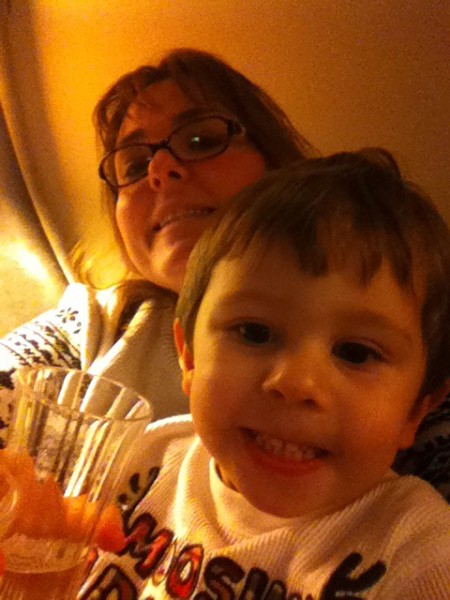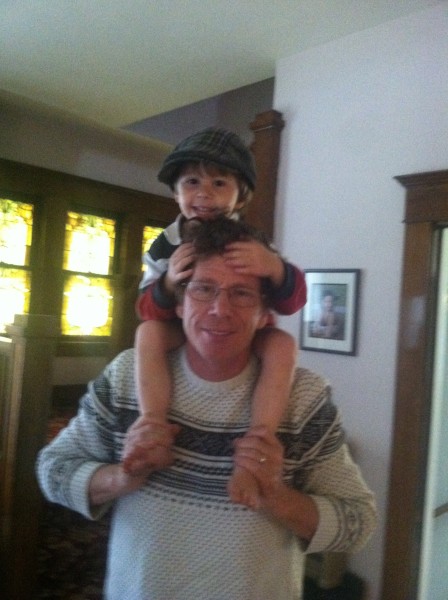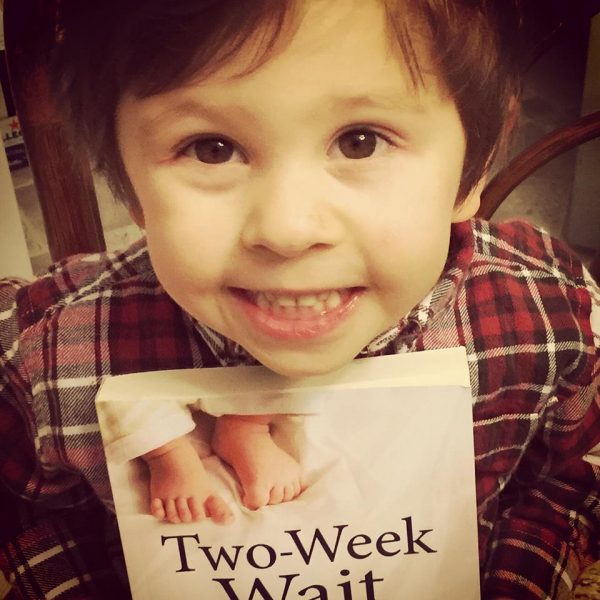Many would have surrendered. Given up. Quit.
But not Chistina Fisanick Greer. For some reason, she fought back. Time after time, she bounced instead of falling shattered.
She encountered adversity at a very early age as neither of her parents returned to school after the eighth grade. But Christina did. School became her thing, and she continued her education at John Marshall High School until, that is, she learned she was pregnant at 17 years old. Then she, too, became a dropout.

Three-and-a-half months after the birth of Christina’s daughter, the infant was murdered by the father. The cause of death was Shaken Baby Syndrome, and her first husband was found guilty and sentenced to prison for seven years. Despite her anger and sadness, Christina visited him many times because of desperation. She wanted to know. She needed to know why.
Then one day the man excused his crime, blaming his issues on alcoholism and low self-esteem for killing Samantha. After that, Christina never returned and soon divorced him. She didn’t buy it, so she mourned alone and even returned to high school for her senior year.
“I didn’t realize how much nerve it took for me to go back to school at the time. Everyone knew everything about what had happened because it was all over the news,” she said. “Everyone knew I didn’t do anything wrong, but that didn’t stop them from the whispering.”
After she graduated from John Marshall, she applied and enrolled at West Liberty University in 1993 and earned two undergraduate degrees in three years. She then was accepted into the master’s and doctoral programs at Ohio University, and just before she was scheduled to receive her Ph.D. in English, Christina discovered she was pregnant again.
The child was born prematurely, however, and survived only a week. Christina got to hold Nicholas only once.
“I didn’t have much left inside after that happened,” she admitted.
After teaching at Ohio University for several years, she accepted a position at Xavier University in Cincinnati. Close to a year after her first day, her house in Norwood, Ohio, burned to the ground, killing her six cats.
“They were like my children,” she said. “That fire almost did me in. It made me feel like rolling over in a corner and going away.
“But I got it together, somehow. I still don’t know how. But thank goodness I did.”
Following a divorce from her second husband, Nick, Christina made the choice to move closer to her native Upper Ohio Valley. She was offered employment at West Liberty and California University of Pennsylvania, and she accepted a faculty position at California in 2008. Her wish, though, was to live in Wheeling.
And so she does today with her husband, Jim, and her soon-to-be 4-year-old son, Tristan. Christina has been instructing college-level writing courses for 20 years, and she possesses a prominent writing career, having written more than 30 non-fiction books and multiple articles about writing. Christina also makes several appearances per year, and her next one is set for May 2 from 12-2 p.m. at the Words & Music Bookstore near Stratford Springs in Wheeling.
“I guess my story is one of triumph,” she said. “I have a writing career, a wonderful husband, and my son after everything I’ve been through.”

Novotney: You are a professor at the California University of Pennsylvania, but you continue to live in Wheeling instead of moving closer. Why?
Fisanick Greer: I have been teaching at California University of Pennsylvania since 2008. I taught at Xavier University for five years before that and at Ohio University for seven years before that. Although Xavier and Cincinnati both had much to offer, I longed to return home to the Valley. I grew up in Moundsville, but I always wanted to live in Wheeling. In fact, when I was a little girl, my family and I would take Sunday drives and sometimes we would take National Road through what I thought was the most beautiful neighborhood in the world. I live there now: Woodsdale/Edgwood.
I chose deliberately to buy a house in Wheeling because I love it here. My husband, Jim, is from Wheeling. We are both West Liberty graduates (class of 1996) and that is where we met. I cannot imagine living anywhere else.
Novotney: What is your most favorite aspect about the Friendly City?
Fisanick Greer: I love so many things about Wheeling, but mostly, I love the history. I love where Wheeling has been because it helps me envision where Wheeling might go for my son’s generation.
I also love the parks, the outdoor concerts, and the friendly atmosphere. I’ve never met a stranger in the Friendly City.
For example, right now I am writing an essay about my search for Rebecca Harding Davis’ house. I love that Wheeling and the people of Wheeling have been instrumental in the history of our country. You can find Wheeling’s imprint on everything from glassware to realist writing to union organizing to abolition and so on. I love that about Wheeling.

Novotney: The subjects you write about cover a very broad spectrum. How do you select those topics?
Fisanick Greer: I began writing professionally towards the end of my doctoral program in 2003. I was given an opportunity to write books for Greenhaven Press, which is a subsidiary of the huge education company, Cengage Learning. I really wanted the experience of writing for a large company. Each rotation period, the acquisitions editor would send me a list of possible titles, and I would choose the ones that seemed most interesting to me.
Of all of the books I wrote for Greenhaven Press, my most memorable is, “Rwandan Genocide.” It was an incredibly difficult book to write because of the subject matter. As of last month, the book has sold well over 8,000 copies.
Novotney: You most often address young adults with your work. Why is that?
Fisanick Greer: The books I wrote for Greenhaven were all intended for upper-level high school and beginning college students to use as research tools for controversial issues.
Basically, I wrote for the young-adult audience because it was my job. Normally, I would not write for that audience, but the company I worked for serves that population.
Novotney: Several of your chosen topics involved your life directly. Why is that?
Fisanick Greer: I was introduced to memoir and personal essay writing in graduate school, and I have loved it since then. I have kept a journal since I was around 9 years old, so I had had plenty of experience reflecting on my life, but learning about the form and theory of creative non-fiction radically changed my ideas about becoming a writer.
I write about my life because I truly believe that others can benefit from my unflinching self-reflection. Once people read my story, they tell me theirs, which makes them feel heard and no longer alone. To me, that is worth whatever kind of negative reaction I might get for having “said too much.”
For example, I wrote my latest book, “Two-Week Wait: Motherhood Lost and Found,” as a blog originally. I was trying to help myself by writing it all out, but I quickly found that I was helping others as well. I was routinely contacted by women who were also struggling with infertility. As they read about my 20-year struggle to become a mother, which included the murder of my daughter, Samantha, and the death of my son Nicholas, born prematurely, they identify with my grief. Then, they cheer along with me as they learn that I have finally gotten pregnant and eventually gave birth to my third child, Tristan, who will be four next month.
Novotney: You have also addressed issues about being overweight and the social pressures that placed on you?
Fisanick Greer: Being overweight has had a definite negative impact on some area of my life. I was bullied in part because of my weight and also faced some workplace discrimination because of it. I am sure you may have seen some of the scholarship I have done on fat professor’s bodies. One piece was even covered by the Chronicle of Higher Education. I remain an advocate for academics of all shapes, sizes, and abilities.
Novotney: You continue your recovery from Binge Eating Disorder, or BED. Tell me about that battle.
Fisanick Greer: I have been overweight since age 11, which is when I developed the first signs of binge eating disorder, which is a common psychological disorder faced my many Americans. I entered recovery from BED in 2013, and I continue striving to get well. To aid in that recovery, I have created a very popular Facebook support group for Food Addiction (BED) sufferers. I have nearly 5,000 international members. In addition, I have created a brand new website to support sufferers in their recovery efforts: OptimisticFoodAddict.com.
Novotney: What do you feel is the key to your recovery?
Fisanick Greer: Writing is key to my recovery. In fact, I am currently halfway through a new memoir, “The Optimistic Addict: Recovering from Binge Eating Disorder,” which traces the development of my eating disorder and explores my now 30-year journey to recover.

Novotney: Do you feel you have made a difference with your writing?
Fisanick Greer: As a writing professor and professional writer, I know that I have made a difference in the lives of many of my readers. I know this because they tell me, and each and every time I get a message from a reader who says that my words have changed him or her or have moved him or her, I feel elated, like all the long nights at my writing desk have been worth it.
Novotney: What is the next topic you plan to tackle with your writing?
Fisanick Greer: After I send out “The Optimistic Addict” to be published (before the end of 2015), I am going to move into a genre with which I have very little experience as a writer but a great deal of experience as a reader: historical fiction. I have been collaborating with the Heinz History Center in Pittsburgh for the past three years. My Honors students and I work together with their local affiliates to create digital stories that showcase their collections. All of the time I have spent with the historical societies has sparked my interest in doing a little historical fiction writing of my own. In January 2015, I will begin work on a novel tentatively called “1818 Harvey Lane,” which will be about three different families that have lived in a house very similar to my own. The book will begin in Wheeling in 1924, when the first occupants marry and begin building the house and will continue on to the next set of occupants, who move in in 1948. The book will end with the last family, who move in in 2001.
I am absolutely thrilled to have the opportunity to write for Weelunk. I am excited for the future of Wheeling. I want to be part of it.

Editor’s Note: Christina has agreed to begin contributing articles to Weelunk. Watch for her soon!
(Photos supplied by Christina Fisanick Greer)





